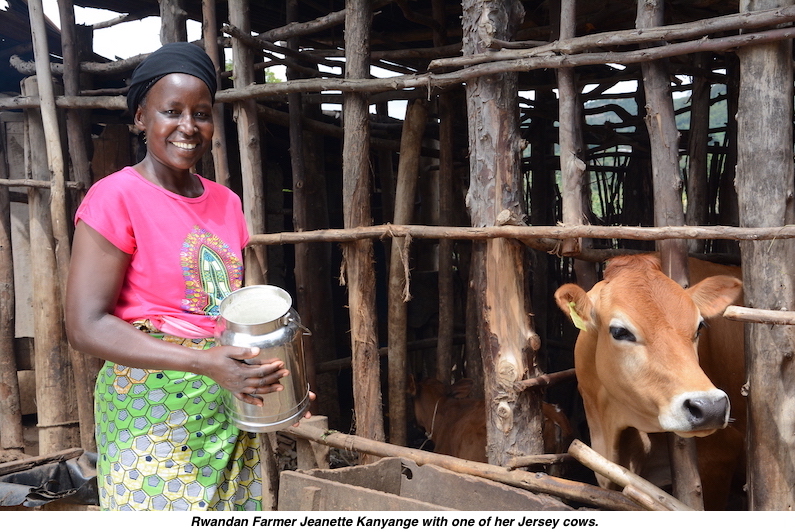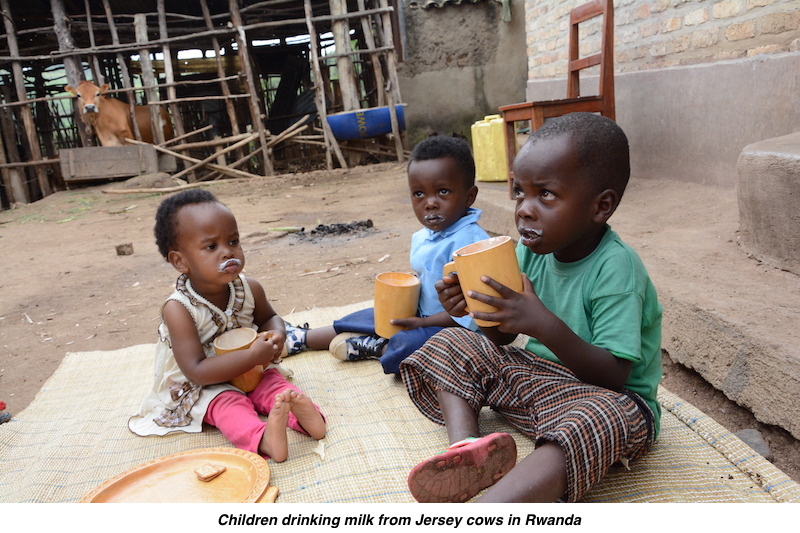Dairy as a force for good: how Jersey cows are transforming Rwandan communities
In Rwanda, Send a Cow’s Inka N’ziza project is helping to shape future dairy strategy and rebuilding local communities in the process.

In 1994 it would’ve been almost unimaginable that the humble Jersey cow would be helping to lift Rwandans out of poverty and rebuilding ‘le pays des mille collines’ following the effects of a devastating civil war.
Back then genocide decimated communities and the economy in the ‘land of a thousand hills’, leaving around 800,000 dead in just 100 days as many families were plunged into almost immediate poverty.
Yet, more than a quarter of a century later Jersey cows are making a real difference to the local dairy industry, thanks to a successful cross-breeding programme between the Royal Jersey Agricultural and Horticultural Society (RJHAS) and Send a Cow (SAC), a charity working with smallholder farms in Africa.
In just over five years since this was launched, the adaptability of Jersey herds has meant that farmers are now seeing strong yields of nutritious milk being delivered to the many women who were left to run households in the wake of the genocide.
Moreover, successful projects, such as Inka N’ziza (Kinrwandan for Good Cow) being run by the charity and its partners, are helping to shape the lives of future generations by providing training and new facilities that provide sustainability and profitability for those involved.
One of those benefiting from this scheme is Jeanette Kanyange, a 53-year-old farmer and mother of two who lost her husband during the war.
By working with SAC, she has employed a ‘zero grazing’ model to triple her income on a farm where she grows napier grass, desmodium and calliandra for her cows, as well as bananas, coffee and beans.
Prior to working with the charity, cows roamed freely, making her unable to collect manure that could prove beneficial to future income. Today, they live in a model SAC shed that was constructed with the help of the Inka N’ziza project. “Since moving cows to zero grazing I have been able to collect the manure and use it on my banana plantation,” she explains. “This has tripled my income from 20,000 to 60,000 RWF per month, with the sale of bananas providing the majority of my income.”
Ms Kanyange, who has two Jersey/Holstein Friesian crosses and three Holstein Friesians, has used lessons learnt from local sector office staff and vets sent to educate farmers on the benefits of breeding with Jersey cows to improve milk production. This has led to her developing a closer affinity to the high yield, low maintenance Jersey which she is now recommending to neighbours alongside zero grazing.
“I have a preference for the Jersey breed as the traditional Rwandan cows consume much more fodder than the Jersey cows, but produce a similar amount of milk,” she adds.
Although she earns the same amount from Friesian and Jersey milk at market, Kanyange says that family members prefer the taste of milk from the Jersey cows which she believes are more suited to the climate of the Rwandan countryside.
This, she says, is key for those farmers with small plots who lack the ability to grow much in the way of fodder whilst at the same time giving them the opportunity to produce lots of milk.

Another to have benefited from the work done by SAC in Rwanda is 46-year-old paravet Clarisse Nyinawumuntu, a widowed mother of three.
She is helping to create a brighter future for others by acting as a ‘bridge’ between sector veterinary officers and local farmers.
“We act as advisors to farmers on improved animal management,” she says. “We advise on all types of livestock, not just cows, but also goats, pigs and chickens.”
Nyinawumuntu began working with SAC in 2015 before joining the Inka N’ziza project and being selected to train as a paravet. She believes that the training has proved beneficial when it comes to improving hygiene and sanitation of livestock and the prevention of common ailments such as mastitis and tick-borne diseases.
Working as a paravet across 2 sectors, Ms Nyinawumuntu is one of 3 female paravets in the area – something she says makes her feel more empowered and valued in the local community.
“Before when my cow fell sick, I looked to men to treat them and would have to pay them,” she adds. “Now I know how to look after and treat my cow which makes me feel empowered. Being a paravet has also built my confidence and pride. When I visit other farmers and advise them, they feel proud that a woman is able to advise them.”
Orrani has been supporting the great work Send a Cow is doing for a number of years. If you would like to get involved please visit: https://sendacow.org
